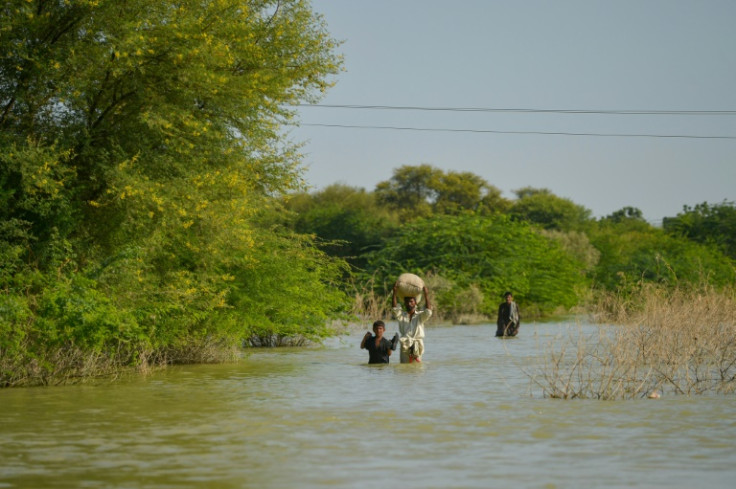Around 100,000 people evacuated as rains batter Pakistan
Pakistan has yet to fully recover from last year's catastrophic floods.

Weeks of heavy rain have again battered Pakistan, leaving thousands stranded and in need of emergency assistance. The authorities have evacuated over 100,000 people from flooded areas in Pakistan's Punjab province, emergency services announced on Wednesday.
The overflowing Sutlej River has left hundreds of villages inundated in the last three weeks. The river swelled to "extremely high levels" on Saturday, prompting local authorities to take swift action.
Pakistan's chief meteorologist, Muhammad Aslam, has said that the river was flowing at its highest in 35 years. The most affected districts are Bahawalpur and Kasur in Punjab province. The Punjab Disaster Management Agency has said that the situation is expected to worsen in the coming days.
More than 175 people have now died in separate rain-related incidents since late June, per a report in DW.
Pakistan has not yet been able to fully recover from last year's catastrophic floods, and the rains have already begun to wreak havoc on the South Asian country again. The photos and videos that have gone viral on social media show several places submerged in water after just a few days of rain.
Last summer, monsoon rains damaged 2 million homes and killed more than 1,700 people in Pakistan. The record monsoon rains and melting glaciers led to a disaster of epic proportions in the country.
Multiple experts have blamed climate change for the damage witnessed by the South Asian nation. United Nations Secretary-General Antonio Guterres described the flooding as a "monsoon on steroids" and a "climate catastrophe."
"I have seen many humanitarian disasters in the world, but I have never seen climate carnage on this scale. I have simply no words to describe what I have seen today," he said during his visit to the flood-ravaged country last year.
Floods In Pakistan 2023 pic.twitter.com/5jUao0qLFu
— Nasir Dhillon (@nasirdhilllon6) August 23, 2023
The floods swept away entire villages, bridges, and roads. A third of the country's territory was inundated with water at one point. The authorities are still struggling to get people back on their feet.
More than 100,000 residents of Pakistan's eastern Punjab province were reportedly evacuated due to heavy floods that hit the area in the in the past three weeks. The rescue operations were expanded last week when the Sutlej River started overflowing, inundating several districts pic.twitter.com/nhxSEHVFOg
— RT (@RT_com) August 24, 2023
While monsoon rains killed hundreds of people in countries like Bangladesh and Pakistan last year. Climate change has brought many countries in East Africa to the brink of famine.
A report by the United Nations has said that pollution, extreme weather events, droughts, and floods have affected millions of people across the world. The number of "climate refugees" is only expected to rise if temperatures are not controlled.
According to a report by the UN's World Meteorological Organisation (WMO), two million people have already been killed by extreme weather, climate, and water-related events since 1970.
Scientists and climate activists have been urging governments to reduce their reliance on fossil fuels such as coal, oil, and gas since these are the major sources of climate-warming greenhouse gas emissions.
Climate scientists have warned of the consequences the planet might face if humans do not limit the global temperature rise to 1.5 °C above pre-industrial levels.
Professors Johan Rockstrom of the Potsdam Institute for Climate Impact Research and David King, chair of the Centre for Climate Repair at the University of Cambridge, have said that failure to limit the temperature rise could lead to the collapse of life on the planet.
© Copyright IBTimes 2025. All rights reserved.






















